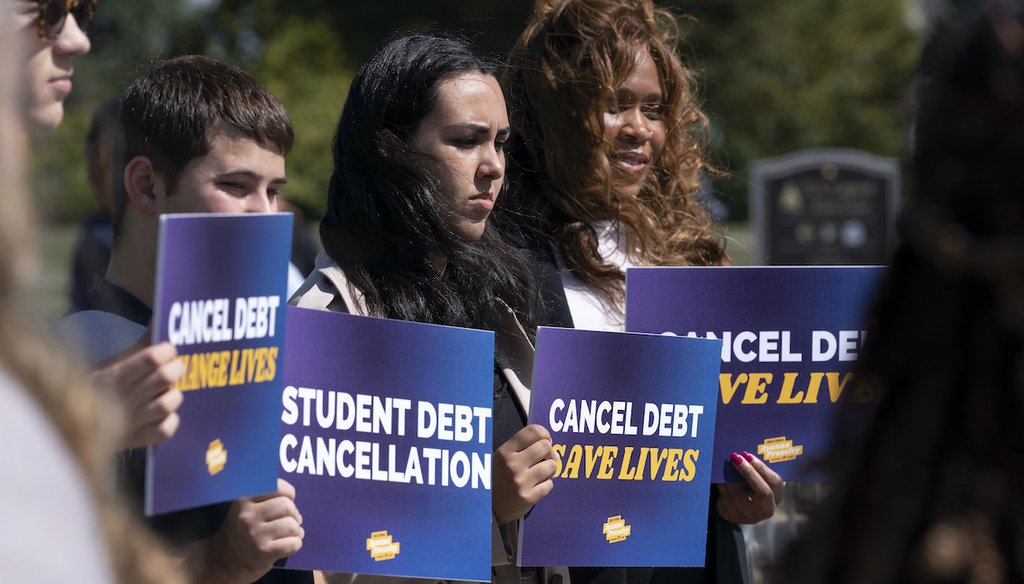Stand up for the facts!
Our only agenda is to publish the truth so you can be an informed participant in democracy.
We need your help.
I would like to contribute

Activists hold signs during a news conference on student debt cancellation on Capitol Hill in Washington, Thursday, Sept. 29, 2022. (AP)
Tim Ryan opposes Biden’s student debt plan. He previously supported debt relief
If Your Time is short
-
U.S. Rep. Tim Ryan, D-Ohio, opposed President Joe Biden’s plan to forgive $10,000 in student debt or up to $20,000 for low-income Pell Grant recipients. But he has not denounced all student debt relief.
-
Ryan spoke broadly in favor of student debt relief while seeking the Democratic presidential nomination in 2019.
-
Ryan also supported and co-sponsored legislation in 2020 during the first few months of the COVID-19 pandemic to forgive some student debt.
U.S. Rep. Tim Ryan, D-Ohio, broke with President Joe Biden over his plan to forgive student debt, saying it "sends the wrong message to the millions of Ohioans without a degree working just as hard to make ends meet."
Ryan’s words in August were met with accusations from the Republican National Committee and others that he flip-flopped on student debt relief.
Scott Sands, a broadcaster at iHeartradio who interviewed Ryan on Oct. 3, was among those noting a change in Ryan’s stance. He said that Ryan supported student debt relief while running for president in 2019. Sands also said that Ryan voted in favor of legislation in 2020 that would relieve up to $10,000 in student debt.
"That would be a flip-flop there on student debt cancellation," Sands said during the interview.
In his response, Ryan didn’t directly address Sands’ characterization of his actions amounting to a "flip-flop." But Ryan said that he would rather allow people with student debt to negotiate their interest rates down to 1 or 2%. "That is going to put money in people's pockets. I think that's the cleanest way to go about doing it." Ryan also said Biden’s debt plan didn’t address the root cause of the high cost of higher education.
We decided to put Ryan’s statements on PolitiFact’s Flip-O-Meter, which evaluates whether a politician has flip-flopped, and to what extent. The Flip-O-Meter does not make a value judgment on such shifts, but seeks to document them. Some voters may agree with a politician’s shift on a stance while others may see it as a sign of inconsistency.
After examining his record, we found Ryan has made a partial change in position.
Breaking with Biden on student debt is one way that Ryan has sought to portray himself as independent of the Democratic party in the state that former President Donald Trump won by 8% in 2020. Polls show a close race between Ryan and Republican J.D. Vance.
Ryan has generally supported some student debt relief measures
We found multiple statements by Ryan showing that he supported student debt relief. While some of his statements lacked specific details such as dollar figures, his votes showed he took action in favor of student debt relief.
In July 2018, Ryan announced that he was cosponsoring three bills that would make a college education tuition-free and debt-free. But these bills did not include eliminating any dollar figure of student debt. Instead, the bills called for making college free for those making up to $125,000 and allowing Americans to refinance student loans at lower interest rates.
A month later Ryan tweeted, "Student debt is out of control. If we can bail out the banks who did everything wrong, we can help out the students who did everything right."
While seeking the Democratic nomination for president in 2019, Ryan was asked in an interview on CNN about student debt relief proposals by two of his competitors, Sens. Elizabeth Warren and Bernie Sanders. Warren’s plan called for forgiving $50,000 in student loan debt for those earning under $100,000 a year while Sanders proposed more sweeping debt relief.
Ryan said he would have to look at the plans in detail, "but I think doing something along those lines is going to put significant amounts of money into the pockets of working-class people and I'm supportive of that. It's also going to be good for the economy."
But he also added, "We've got a lot of working-class people that didn't go to college. We've got a lot of people who have other issues as well. And so that particular issue needs to be balanced in the context of all the other things that we have to do."
In 2020, early in the COVID-19 pandemic, Ryan supported a few bills to provide student debt relief. Ryan supported the CARES Act, a sweeping COVID-19 aid bill that paused payments on federal student loans and included no income or borrowing limits. The bill passed the House by voice vote and passed the Senate in March 2020.
Two months later, the House — including Ryan — voted for the Heroes Act of 2020. It included a pause on payments for private loans of up to $10,000 as well as forgiveness of up to $10,000 for private or federal loans for borrowers who were economically distressed. The bill passed the House in May 2020 but stalled in the Senate.
In May 2020, Ryan cosponsored the Opportunities for Heroes Act to provide $25,000 in either student loan debt relief or education benefits for essential workers and their families. The bill never received a vote.
Ryan voted in favor of an amendment to the National Defense Authorization Act to provide up to $10,000 in relief for private student loan borrowers. The amendment sponsored by Rep. Madeleine Dean, D-Pa. passed the House in July 2020 but did not make it into the final legislation.
Ryan opposed Biden’s plan
In August, Biden announced a student loan forgiveness plan to cancel $10,000 of student debt or up to $20,000 in debt cancellation for lower-income Pell Grant recipients. Borrowers are eligible for the relief if their individual income is less than $125,000 or $250,000 for married couples. Biden’s plan is the subject of multiple lawsuits.
Ryan immediately announced criticism of Biden’s plan.
"As someone who's paying off my own family’s student loans, I know the costs of higher education are too high," Ryan said. "And while there's no doubt that a college education should be about opening opportunities, waiving debt for those already on a trajectory to financial security sends the wrong message to the millions of Ohioans without a degree working just as hard to make ends meet."
But Ryan did not denounce all forms of student debt relief. He called for "targeted forgiveness for essential workers and more opportunities for student borrowers to refinance their loans." He also said he supports other ways to help the middle class including tax cuts, medical debt cancellation and investing in workforce development and training programs.
Days later, on CNN’s "State of the Union," Ryan said, "There's a lot of people out there making 30, 40 grand a year that didn't go to college, and they need help as well, which is why I have been proposing a tax cut for working people that will affect everybody."
We asked Ryan’s campaign spokesperson Izzi Levy why he supported student debt relief proposals before his Senate bid but opposed Biden’s plan.
Levy said Ryan supports more targeted relief and "prioritizing across-the-board economic relief that benefits all working- and middle-class Ohioans, whether or not they attended college."
Our rating
Republicans have said that Ryan flip-flopped on student debt.
Ryan spoke broadly in favor of student debt relief in 2018 and while running for president in 2019. In 2020, he voted in favor of or supported multiple bills that aimed to provide relief, including two that included up to $10,000 in relief. And he cosponsored a 2020 bill to provide $25,000 in student loan debt relief or education benefits to essential workers and their family members.
In August, Ryan announced that he disagreed with Biden’s plan to provide $10,000 in student debt relief and up to $20,000 for low-income Pell Grant recipients. Borrowers are eligible for the relief if their individual income is less than $125,000 or $250,000 for married couples.
Ryan has not stated that he opposes all student debt relief, but his opposition to Biden’s plan marks a partial change.
We rate his position Half Flip.
RELATED: Most relief from Biden’s student loan forgiveness plan flows to lower-income borrowers, not higher
RELATED: Is Joe Biden’s student debt forgiveness plan legal?
RELATED: 40% of student borrowers lack a four-year degree
RELATED: Tim Ryan on the Truth-O-Meter
RELATED: J.D. Vance on the Truth-O-Meter
Our Sources
Scott Sands show, Interview with Rep. Tim Ryan, Oct. 3, 2022
Republican National Committee, Tim Ryan flip flops on student loans, Aug. 26, 2022
Fox News, Democrat Tim Ryan breaks with Biden over student loan debt handout, says it 'sends the wrong message' Aug. 24, 2022
Cleveland Plain Dealer, Rep. Tim Ryan's criticism of student loan debt forgiveness alters prior stance, Aug. 25, 2022
Daily Beast, Tim Ryan sidesteps past support for student debt relief while putting it down, Aug. 29, 2022
CBS, Rep. Tim Ryan breaks from Biden on student debt relief plan, Aug. 28, 2022
CNN, Transcript, June 25, 2019
CNN, State of the Union transcript, Aug. 28, 2022
U.S. Rep. Tim Ryan website, Helping our students win the future, Accessed Oct. 6, 2022
The Daily Beast, Tim Ryan Sidesteps Past Support for Student Debt Relief While Putting it Down; The congressman and Senate candidate said a broader tax cut was the way, Aug. 28, 2022
U.S. Rep. Tim Ryan press release, Rep. Ryan Votes to Support Latest COVID-19 Relief Package, May 18, 2020
U.S. Rep. Tim Ryan press release, Congressman Tim Ryan Endorses Tuition-Free and Debt-Free College, July 25, 2018
U.S. Rep. Tim Ryan, Tweet, Aug. 29, 2018
U.S. Rep. Tim Ryan press release, Congressman Tim Ryan Applauds Passage of Coronavirus Economic Stabilization Package, March 27, 2020
Congress.gov, H.R.748 - CARES Act, Senate vote March 25, 2020
Congress.gov, H.R.6800 - The Heroes Act, House vote May 15, 2020
Congress.gov, H.R.6699 - Opportunities for Heroes Act of 2020, Introduced May 5, 2020
U.S. Rep. Madeleine Dean, The House Adopts Rep. Dean's Amendment to NDAA Providing Relief to Millions of Private Student Loan Borrowers, July 21, 2020
Telephone interview, Mark Kantrowitz, a student loan policy specialist and author of "How to Appeal for More College Financial Aid." Oct. 6, 2022
Email interview, Emma Vaughn, Republican National Committee spokesperson, Oct. 4, 2022
Email interview, Izzi Levy, U.S. Rep. Tim Ryan, D-Ohio campaign spokesperson, Oct. 6, 2022
Browse the Truth-O-Meter
More by Amy Sherman
Tim Ryan opposes Biden’s student debt plan. He previously supported debt relief
Support independent fact-checking.
Become a member!
In a world of wild talk and fake news, help us stand up for the facts.














































